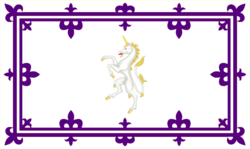Flag of Caldia: Difference between revisions
m (Glitter moved page Flag of Glytter to Flag of Caldia) |
No edit summary |
||
| Line 50: | Line 50: | ||
</gallery> | </gallery> | ||
[[category:Culture of Glytter]][[Category: | [[category:Culture of Glytter]][[Category:Caldia]] | ||
Revision as of 02:08, 24 January 2020
| Name | The Unicorn Rampant Flag of Caldia |
| Use | Civil flag and ensign |
| Proportion | House banner is 5:4 ratio
Mass-produced renditions tend towards 1:2 or 2:3 ratio |
| Adopted | 1221 |
| Design | A white unicorn rampant, with yellow claws, mane, and horn, with a red tongue, displayed within a purple double border on a white background. |
The Flag of Caldia, officially called the Unicorn Rampant (Ghaillish: Uilereithe Aonbheannach), and historically known as the Queen's Flag (Bratach na Banríona), is a white unicorn rampant, with yellow claws, mane, and horn, with a red tongue, displayed within a purple double border on a white background.
The flag was originally served as the royal standard of Caldia from around the 9th century, based upon the arms of the Mac Aillán kings and queens. It was officially adopted as the national flag in the 13th century, replacing Saint Cuchulain's Flag. It served dually as national and royal standard until the 1850s, when it was replaced with the current Royal Standard of Caldia.
History
The Unicorn Rampant was first adopted by King Alastar in 1221 as part of his Splendid Centralisation. It had served as the Royal Standard since the reign of Lughaidh I, having first been seen at the Battle of Basdon. The arms of the House of Mac Aillán were adapted to a 5:4 ratio. Alastar, himself a member of the House of MacIconnich, made the Standard the national flag in an attempt to draw further legitimacy from the original royal house. The arms Caldia had since been changed to the familiar arms of the MacIconnichs, from which Saint Cuchulain's Flag was created.
The actual dimension ratios and colours of the flag were not officially standardised until 1858. However, they were standardised for use in the Royal Court in 1754. An act of the Royal Congress established the official dimensions as 5:4 under the National Flag Act of 1858.
- GlytterOldArms.png
The arms of the House of Mac Aillán.
- RoyalStandardGlytter.png
The current Royal Standard, an inverse of Saint Cuchulain's Flag with the Royal Badge imposed upon it.
Variants
- GlytterNavalEnsign.png
The naval ensign of the Royal Caldish Navy.
Alternative proposals
- Glyt Tricolor.png
A proposed tricolour with the lesser arms of Caldia imposed. It was rejected by the Tionól in the 1850s.
- Proposed Vertical Tricolor of Glytter.png
A vertical tricolour was proposed during the late 1910s but was also rejected.
Historical flags
- ArmyLJBanner.png
The Banner of the Army of the Lord and Justice. Used as the personal standard of Queen Natalie, it fell out of use.
- Ealaghleann Flag.png
The flag of Ealaghleann, an emerald cross with the Unicorn Rampant placed in the top left canton.
- SDL Flag.png
Flag of Saor Glítteann.
- Gaylic League Flag.png
Fiann Gael.
- UGF Flag.png
Flag of the United Ghaillish Workers' Front short-lived Caldish People's Republic.
